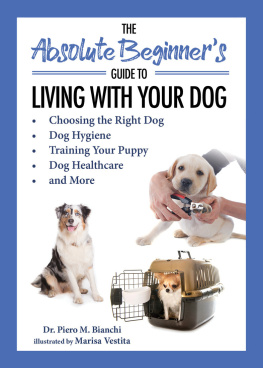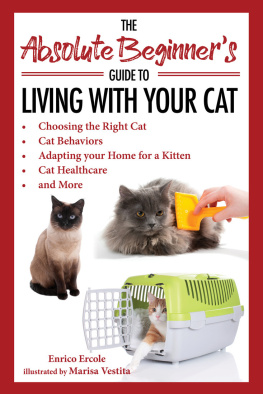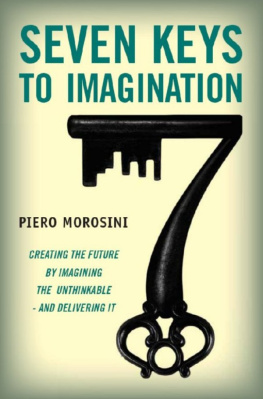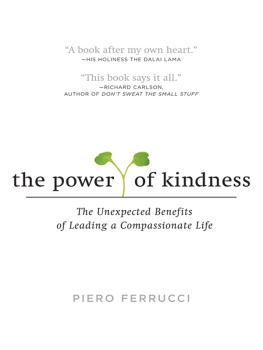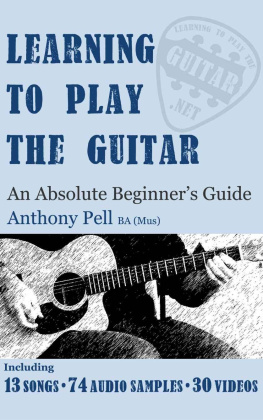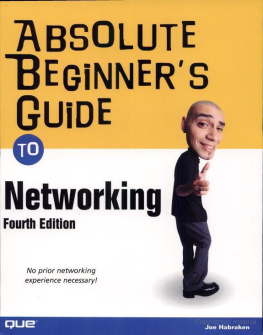Piero Bianchi - The Absolute Beginners Guide to Living with Your Dog
Here you can read online Piero Bianchi - The Absolute Beginners Guide to Living with Your Dog full text of the book (entire story) in english for free. Download pdf and epub, get meaning, cover and reviews about this ebook. year: 2020, publisher: Racehorse, genre: Home and family. Description of the work, (preface) as well as reviews are available. Best literature library LitArk.com created for fans of good reading and offers a wide selection of genres:
Romance novel
Science fiction
Adventure
Detective
Science
History
Home and family
Prose
Art
Politics
Computer
Non-fiction
Religion
Business
Children
Humor
Choose a favorite category and find really read worthwhile books. Enjoy immersion in the world of imagination, feel the emotions of the characters or learn something new for yourself, make an fascinating discovery.
- Book:The Absolute Beginners Guide to Living with Your Dog
- Author:
- Publisher:Racehorse
- Genre:
- Year:2020
- Rating:4 / 5
- Favourites:Add to favourites
- Your mark:
- 80
- 1
- 2
- 3
- 4
- 5
The Absolute Beginners Guide to Living with Your Dog: summary, description and annotation
We offer to read an annotation, description, summary or preface (depends on what the author of the book "The Absolute Beginners Guide to Living with Your Dog" wrote himself). If you haven't found the necessary information about the book — write in the comments, we will try to find it.
The Absolute Beginners Guide to Living with Your Dog — read online for free the complete book (whole text) full work
Below is the text of the book, divided by pages. System saving the place of the last page read, allows you to conveniently read the book "The Absolute Beginners Guide to Living with Your Dog" online for free, without having to search again every time where you left off. Put a bookmark, and you can go to the page where you finished reading at any time.
Font size:
Interval:
Bookmark:


Copyright 2016 by Piero Bianchi
First Racehorse Publishing edition, 2020
Originally published in 2016 in English as Living in Harmony with Your Dog by White Star SRL
All rights reserved. No part of this book may be reproduced in any manner without the express written consent of the publisher, except in the case of brief excerpts in critical reviews or articles. All inquiries should be addressed to Racehorse Publishing, 307 West 36th Street, 11th Floor, New York, NY 10018.
Racehorse Publishing books may be purchased in bulk at special discounts for sales promotion, corporate gifts, fund-raising, or educational purposes. Special editions can also be created to specifications. For details, contact the Special Sales Department, Skyhorse Publishing, 307 West 36th Street, 11th Floor, New York, NY 10018 or .
Racehorse Publishing is a pending trademark of Skyhorse Publishing, Inc., a Delaware corporation.
Visit our website at www.skyhorsepublishing.com.
10 9 8 7 6 5 4 3 2 1
Library of Congress Cataloging-in-Publication Data is available on file.
Translation by Contextus Srl, Pavia, Italy (Vittoria Farallo)
Cover design by Kai Texel
Cover image credit: Getty Images
Print ISBN: 978-1-63158-593-7
E-Book ISBN: 978-1-63158-596-8
Printed in China

Contents
.
.
.
.
.
.
.

Choosing the Right Dog

Those who choose a dog as a friend and companion dont just share a house and a life, but they usually establish a long lasting partnership and research suggests that they benefit from the commitment on a psychological as well as on a physical level.
Starting from childhood, we must underline that living with a dog, children establish an extremely important relationship, enriching themselves with several positive effects. Child psychologists highlight how dogs share with children their dependency on adults in order to survive. Growing up with a dog, the child will play different roles within the relationship, such as being a parent, a peer and a son or daughter. Each step of child development can be enriched by a dog, due to the endless shades of meaning that the pet can take on during his or her growing-up process. A dog, basically, acts as a security blanket: thanks to their emotional bond, the child perceives continuous assurance and reassurance which allows him or her to move forward both on a physical and psychological level, exorcising his or her fear of the unknown and strengthening his or her inner self. Dogs are real life lessons: they allow children to become aware of their own existence as living beings as well as of the duties and responsibilities of human beings. A dog, in fact, has to be fed, looked after, cleaned, and constantly monitored. The lessons, however, go even beyond that; in fact, animals are born, grow up, get old, fall ill and die. In other words: they live.
Even in an adult context, living together with a dog can be an extremely enriching experience. An ethological Canadian study revealed that living with a dog represents an important prevention and therapy for all sorts of stressful circumstances such as, for example, quarreling with neighbors, bad relationships with colleagues and superiors, health fears, conflicts with partners, traffic and so on. Research points out that those who choose a dog as a friend differ from those who dont own any, in many crucial aspects: they consider their existence highly qualitative, dont experience continuous stress intensively, and face health as well as economic problems in a better way. They only occasionally suffer from psychosomatic disorders (such as, for example, irritability, headache, heartburn, depression, circulatory disturbances, dermatological problems) and believe that life critical events (death, divorce, diseases) may be definitely lightened by living together with a pet. The elderly enjoy benefits as well: life quality enhancement and longer life have been acknowledged. More and more often, psychologists state that taking care of a dog represents a panacea to reduce loneliness and prevents depression, increasing social skills. During this delicate stage of life, in fact, we experience a decrease in social relationships: that can lead the elderly to behavior disorders (mainly depression) and psychosomatic problems which lessen their attempts to adapt to situations. Well, it has been scientifically proved that a dog (and the need to take care of it) prevents such difficulties and removes them in cases where the disorders have already occurred. The elderly persons need to love and the urgency to have someone to feel useful and responsible for can be fulfilled by a pet presence. Another very positive aspect is the physical stimulation coming from the relationship with a dog. Walking it several times a day commits one to move and fights sedentariness. It shouldnt be surprising, therefore, that some American insurance companies have reduced health insurance premiums to elderly clients who live together with a four-footed friend. To confirm it, a group of researchers from Texas has proved how elderly people owning a dog seek their doctors advice less frequently than their peers living without pets.

Age
When we decide to buy a dog, one of the first questions to be resolved is the pet age. Is it better to choose a young dog or an adult one? Managing a puppy involves a considerable practical and economic commitment: it has to be watched and taken care of. It has to be taught basic good manners and rules, and needs to learn sphincter control. It needs to play, to go out and walk often, to be fed several times a day. All this without taking into account medical procedures, such as veterinary examinations, vaccinations, deworming, and different kinds of checks. Breeding your pet, following its progress, teaching it the basics of behavior and human relationships, are fundamental steps to shape its character as well as a source of joy and satisfaction for the owner. A young dog or an adult one are definitely easier to manage (especially for time and attention to be devoted), but often give you less intense personal satisfaction. Moreover, it must be taken into account that in most cases, adult dogs are less conditionable in terms of habits and behavior. Instead, if you have decided to get a puppy, the best age to include it in your family is between six and eight weeks, sinceaccording to ethologists and dog psychologiststhat is the age when puppies establish their first social relationships. A too early or a too late inclusion may cause problems and be the reason for behavior disorders in adulthood. Scientific research into dog behavior during the last decades has clarified aspects in that regard. The puppies too much in contact with members of our species sometimes become hyper-addicted to human beings, to the extent that when they become adults, they develop antisocial behavior towards their counterparts (even to the point of sexual impotence).
Next pageFont size:
Interval:
Bookmark:
Similar books «The Absolute Beginners Guide to Living with Your Dog»
Look at similar books to The Absolute Beginners Guide to Living with Your Dog. We have selected literature similar in name and meaning in the hope of providing readers with more options to find new, interesting, not yet read works.
Discussion, reviews of the book The Absolute Beginners Guide to Living with Your Dog and just readers' own opinions. Leave your comments, write what you think about the work, its meaning or the main characters. Specify what exactly you liked and what you didn't like, and why you think so.

